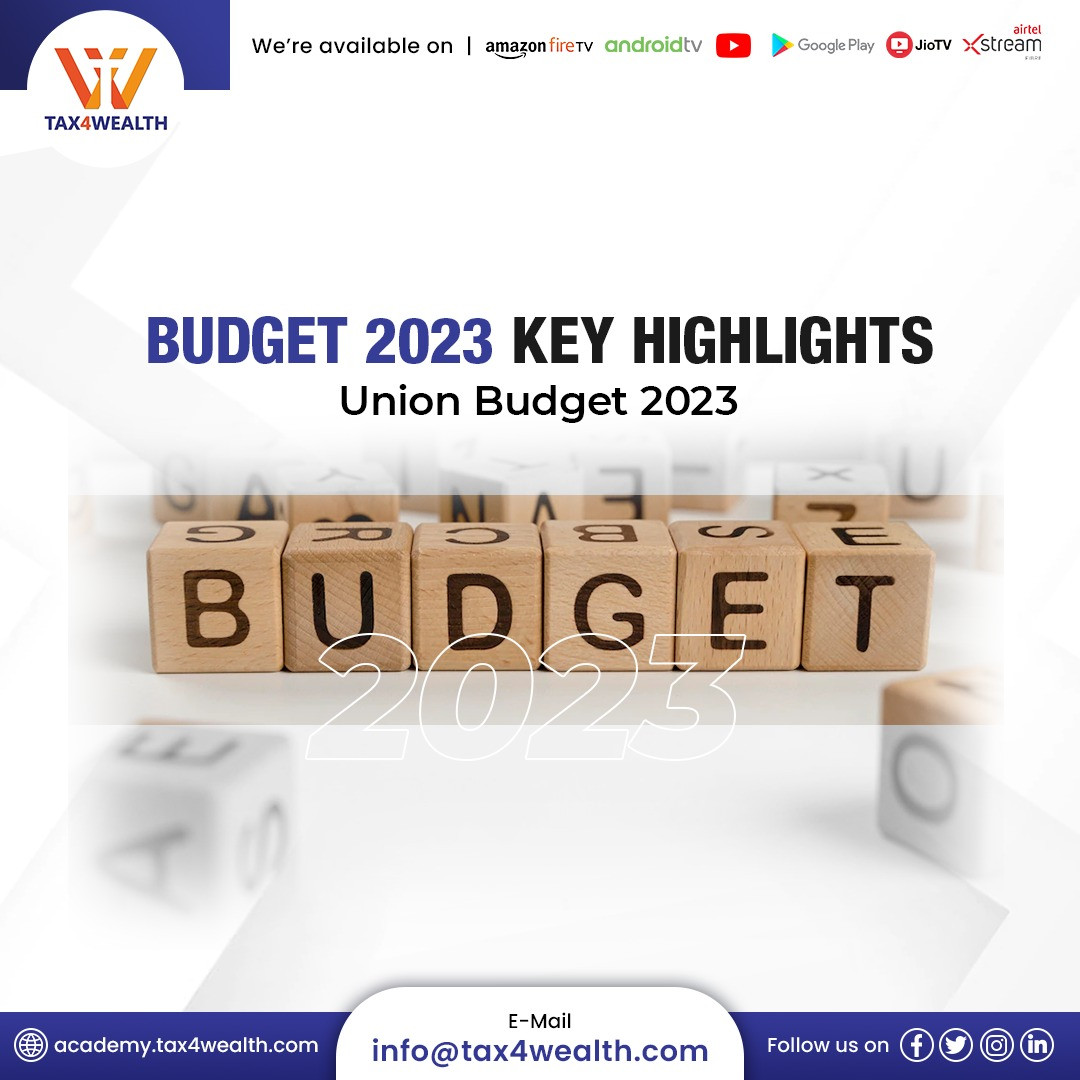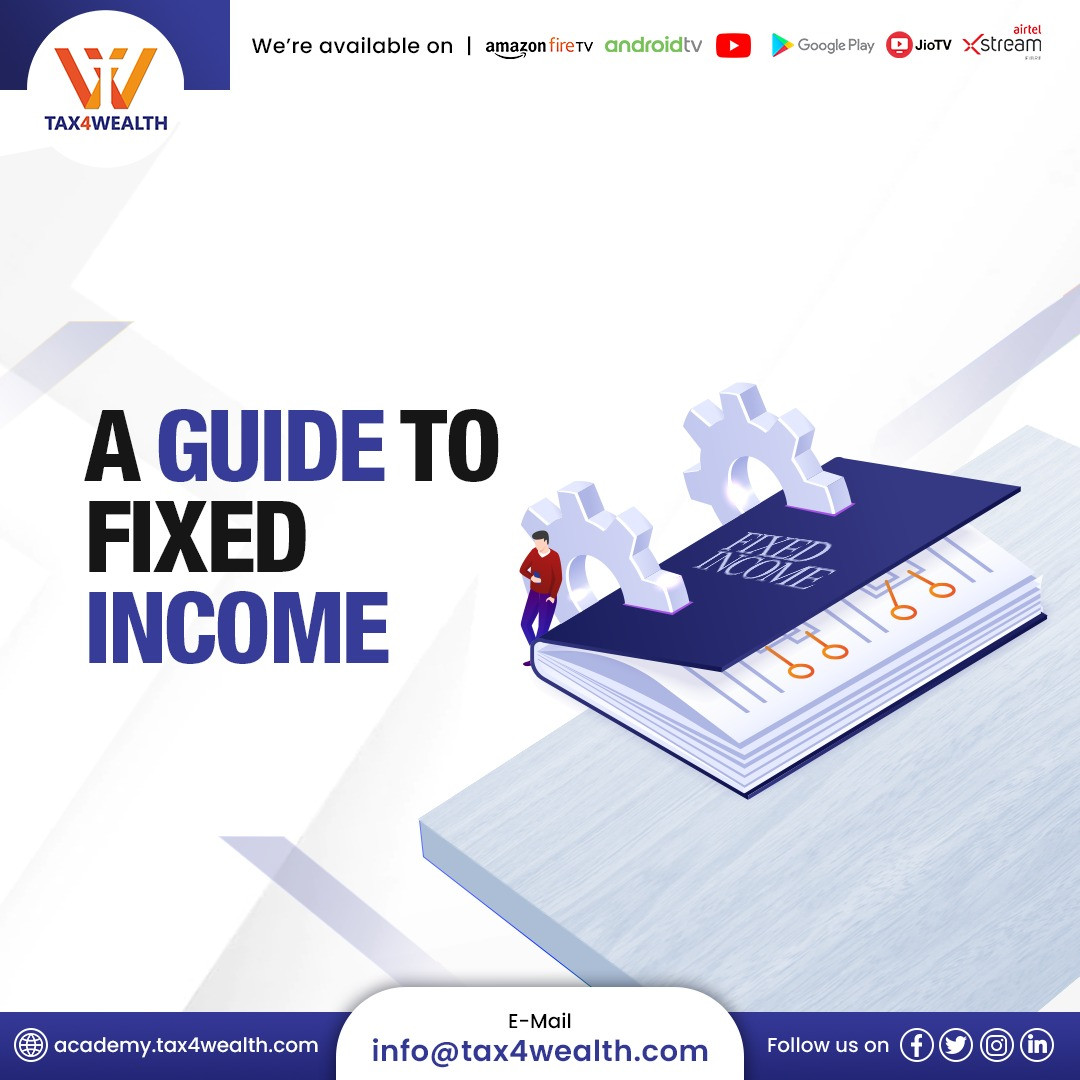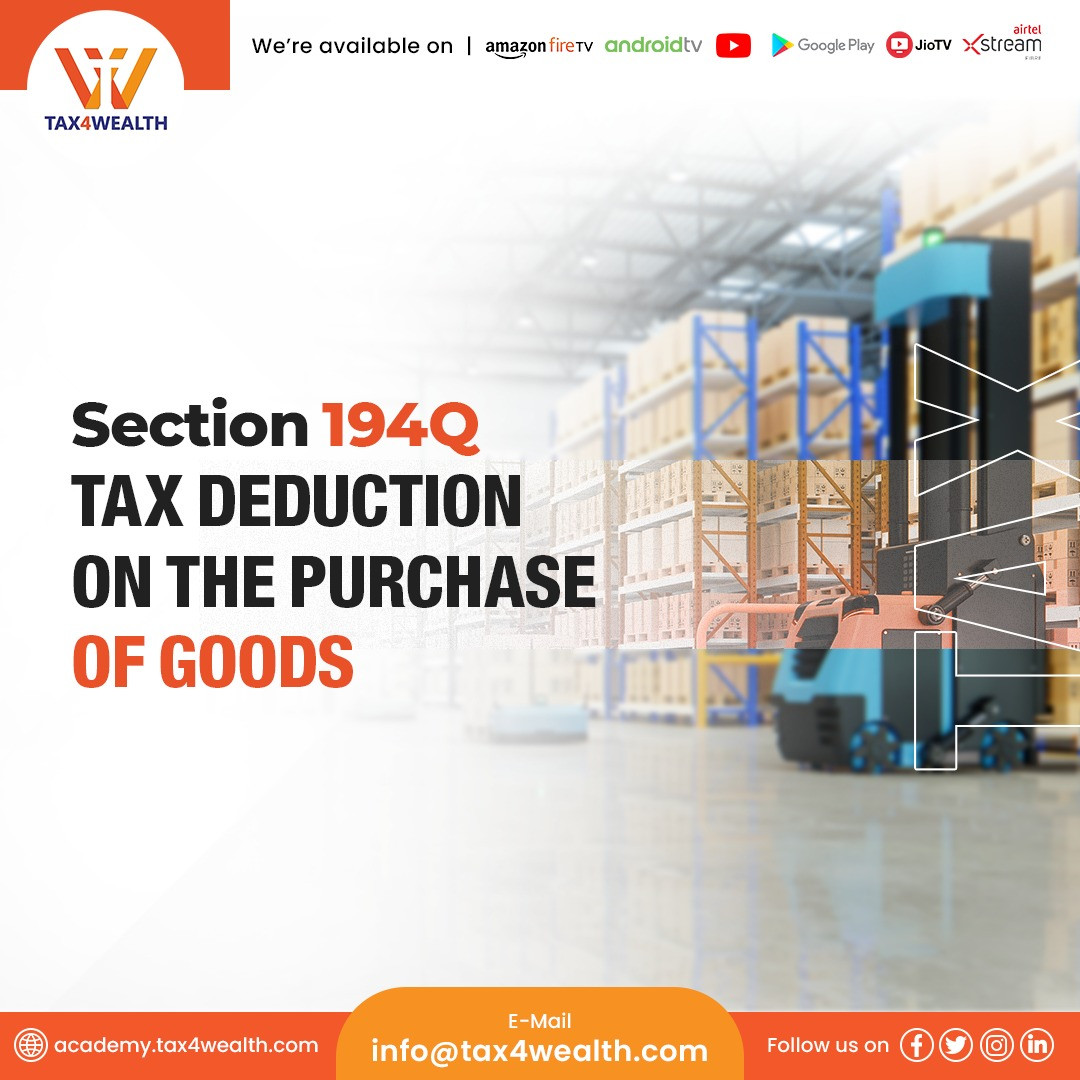
Budget 2023 Key Highlights | Union Budget 2023
Proposal to introduce a next-generation common Income Tax Return form for the benefit of taxpayers-
DEVELOPMENTS IN THE NEW INCOME TAX REGIME:
- The new tax regime will now be the default, but assesses can still benefit from the previous tax regime on an opt-out basis.
- In the new regime, the income cap for the refund under Section 87A has been raised from 5 Lakh to 7 Lakh.
- The highest surcharge rate on income tax over 5 crores has been reduced from 37% to 25%.
- The standard deduction benefit for salaried and pensioners has been increased to 52,500 for each salaried individual with an income of 15.5 Lakh or more.
LIMIT ENHANCEMENT - LEAVE ENCASHMENT:
Raising the tax exemption ceiling on leave encashment on retirement to Rs 25 lakhs for non-government salaried personnel.
NON-PAN EMPLOYEE PROVIDENT FUND CASES:
Section 206AA decreased the tax deduction on EPF withdrawals from the maximum marginal rate to 20% in non-PAN instances.
THRESHOLD LIMIT FOR PRESUMPTIVE TAXATION:
- The threshold limits for the presumptive scheme of taxation for qualifying firms have been raised from 2 crores to 3 crores, and the threshold limits for selected professions have been raised from 50 lacs to 75 lacs.
- The benefits of enhanced threshold limits mentioned above are only available if cash receipts do not exceed 5% of total turnover/gross receipt.
DEVELOPMENT OF MICRO, SMALL, AND MEDIUM ENTERPRISES:
Deduction for expenditure incurred on payments made to MSMEs would be allowed only where payments are made to assist MSMEs in receiving payments on time.
CAPITAL GAIN EXEMPTION - SECTION 54/54F:
To prevent the purchase of very expensive residential buildings, the exemption ceiling for claiming rollover benefits on investments made in residential houses under Sections 54 and 54F of the Income-tax Act has been set at Rs 10 Crores.
GOLD-TO-GOLD RECEIPT CONVERSION & VICE VERSA:
• It is proposed that the conversion of physical gold to Electronic Gold Receipts and vice versa not be recognized as a transfer and not attract capital gains, as well as the advantage of the cost of acquisition and a holding time before conversion.
CLAIM FOR INSURANCE- RELAXATION:
• Amount received from Insurance Policies: If the total premium for life insurance policies (other than ULIP) issued on or after April 1, 2023, exceeds 5 Lakh, the amount is taxed as income from Other Sources.
• It will not affect insurance policies issued before March 31, 2023, if received on the death of the covered individual.
TCS RATES HAVE BEEN INCREASED:
• Section 206C of the Income Tax Act has been changed to increase the TCS levy on overseas travel packages from 5% to 20% and to create a Liberalized Remittance Scheme for the remittance of funds out of India.
RATIONALISATION:
• Income of Authorities, Boards, and Commissions established by Union or State statutes to be exempt from Income Tax in specific industries.
• Tax incentives for money migrating to IFSC, GIFT City are extended until March 31, 2025.
START-UPS - DOI Relaxation and Loss Carryover
• A one-year extension of the Date of Incorporation (DOI) to April 1, 2024, for income tax purposes.
• The benefit of carrying forward losses on changes in shareholding in start-ups was extended from seven to ten years after incorporation.
COOPERATIVE SOCIETIES:
• New cooperative societies formed on or after April 1, 2023, and beginning manufacturing operations before March 31, 2024, will be eligible for a 15% tax break.
• Cooperative societies now have a higher maximum of 3 crores for TDS deduction on cash withdrawals.
HELPING WITH TAX CREDIT MISMATCHING:
Subsection (20) has been added to Section 155, allowing Assesses to apply to A.O. within two years of the end of the Financial Year in which tax was deducted for the allowance of tax credit where the Assesses has shown income in one year and tax has been deducted in the following year, resulting in a tax credit mismatch.
ONLINE GAMING TDS:
• A minimum threshold of 10,000/- will be set for the removal of TDS, and the taxability of online gambling will be defined.
• A proposal to impose TDS and taxation on net winnings at the time of withdrawal or after the fiscal year.
JOINT COMMISSIONER INTRODUCTION (APPEALS):
• Deployment of about 100 Joint Commissioners to handle minor appeals reduce the number of appeals pending at the Commissioner level.
AGNIVEER PLAN:
• Agniveer Fund will be granted EEE status. The Agniveer Corpus Fund payment received by Agniveers registered in the Agnipath Scheme, 2022 is proposed to be tax-free.
• A deduction in the computation of total income is recommended for the Agniveer for contributions made to his Seva Nidhi account by him or the Central Government.
Provisions for charitable trusts and institutions: Rationalization
• Clarify the tax treatment of corpus replenishment and loan/borrowing repayment.
• Only 85% of donations to another trust are considered applications to the donor trust.
• In certain circumstances, combine provisional and regular registration, and in others, allow for straight final registration/approval.
• Form 9A/10A must be filed at least two months before the due date provided in section 139(1) for filing the income tax return.
• Exemption will be granted only if the income return is supplied by sections 139(1)/139(4) and will not be granted even if an Updated Return is filed.
AGRICULTURAL SECTOR:
• Duty reduction on major commodities used in the local production of shrimp feed.
• Reduced Basic Customs Duty on a variety of agricultural products and by-products beginning on February 2, 2023.
ELECTRONIC ITEMS AND APPLIANCES:
• Basic Customs Duty rates are being decreased to support domestic production of electronic items such as mobile phones and electronic appliances such as kitchen chimneys.
JEWELRY AND GEMS:
• Exemption from basic customs tax on seeds used in the production of rough lab-grown diamonds.
• Customs duty reduction on gold, gold dore, and platinum articles.
• Increased customs duty on silver dore, bars, and articles to match gold and platinum.
CHEMICALS
• Duty exemption for denatured ethyl alcohol used in the manufacturing of industrial chemicals.
• Customs tax reduction on acid-grade fluorspar and crude glycerin used in the production of Epichlorohydrin to make the domestic fluorochemicals industry more competitive.
SECTOR OF AUTOMOBILES:
• A rise in the basic customs duty on automobiles, including electric vehicles.
• Duty relief on vehicles selected car parts, and tyres imported for testing and/or certification by notified testing agencies, subject to limitations.
CAPITAL GOODS IMPORT:
• Import of capital items for the fabrication of lithium-ion cells for batteries used in electric vehicles is exempt from basic customs duty.
COMPOSITION SUPPLIERS:
Section 10 of the CGST Act is revised to allow composition taxpayers to engage in inter-state supply of products via e-commerce by amending Clause (d) of Subsection (2) and Clause (c) of Subsection (2A).
NO ITC ON CSR EXPENSES:
Subsection 5 of Section 17 of the CGST Act, 2017 is changed to prohibit input tax credits for goods/services used for Corporate Social Responsibility initiatives.
REVERSAL OF ITC:
The explanation to Section 17 (3) is revised to include in the value of exempt supply the value of transactions relating to the supply of warehoused products before clearance for home use. As a result, ITC about the same will be reversed from now on.
REGISTRATION:
Section 23 of the CGST Act of 2017 APPLIES. Sections 22 and 24 of the CGST Act, 2017 state that the following individuals are not needed to register under the CGST Act, even if Section 24 requires it:
i. A person engaged in the supply of totally exempt products or services.
ii. Agriculturist in terms of provision of produce from land cultivation.
REFUNDS:
The phrase "excluding the amount of input tax credit provisionally approved" was removed from Section 54 (6) of the CGST Act, 2017, simplifying the section's requirements.
PENALTY FOR E-COMMERCE OPERATORS IN GENERAL:
In Section 122 of the CGST Act, a new sub-section (1B) is being added to provide for the penalty applicable to Electronic Commerce Operators in the event of a supply of goods made through them by unregistered persons other than those exempted or by a person who is not eligible to make such supply.
COMPOUNDING OF OFFENCES:
The cost for compounding offenses is reduced under Section 138 (2) of the CGST Act, 2017.
The previously indicated minimum sum of $10,000 or 50% of the tax involved, whichever is greater, has now been decreased to 25% of the tax involved.
The previously stipulated maximum amount of 30,000 or 150% of the tax involved, whichever is greater, has now been decreased to 100% of the tax involved.
TIME LIMIT FOR GST RETURNS:
Filing of GST returns in Form GSTR-1, GSTR-3B, GSTR-9, and GSTR-8 for a specific tax year is not permitted after three years from the due date of furnishing such returns under Sections 37 (5), 39 (11), 44 (2), and 52.
(15) of the CGST Act, 2017, which was just added.
DELAYED REFUNDS INTEREST:
Section 56 of the CGST Act is being revised to permit for the calculation of interest on delayed refunds based on the time of delay.
DECRIMINALISATION OF SOME OFFENSES:
Subsection (1) of Section 132 of the CGST Act is being revised to decriminalize acts described in sub-sections (g), (j), and (k).
DETAILS UPLOADED ON THE COMMON PORTAL ARE SHAREABLE WITH OTHER SYSTEMS.
In the CGST Act, a new section 158A is being added to specify the way and criteria for exchanging the information provided by the registered person on the Common Portal with other systems.
2017 CHANGES TO THE IGST ACT:
Section 2 of the IGST Act is revised to define "non-taxable online recipient" in clause (16).
The proviso to Section 12 (8) of the IGST Act of 2017 has been removed.
Disclaimer:
- This document's information views are personal in nature, intended primarily for information, and do not constitute professional advice to act. Neither our firm nor any partner, employee, or article of our firm shall be liable for any decision made in reliance on this document without first seeking our professional advice or consultation on the subject topic.
- We created and disseminated the aforementioned paper for our clients and Team members of our firm. The same is not being shared with the slightest intention of advertising or soliciting public domain work.
- We created this document based on a speech delivered by India's Finance Minister in Parliament on February 1, 2023.
- The Union Budget, 2023, should be studied in conjunction with the Finance Bill, 2023, for a more detailed understanding of the many adjustments suggested in the Union Budget.
No comments yet, Be the first to comment.













